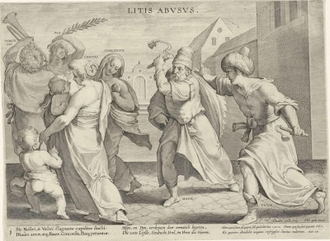Gospel in Art: Love your enemies and pray for those who persecute you

The Four Virtues being Chased, engraving by Theodoor Galle, 1600 © Alamy
Source: Christian Art
Gospel of 17 June 2025
Matthew 5:43-48
At that time: Jesus said to his disciples: 'You have heard that it was said, "You shall love your neighbour and hate your enemy." But I say to you: Love your enemies and pray for those who persecute you, so that you may be sons of your Father who is in heaven. For he makes his sun rise on the evil and on the good, and sends rain on the just and on the unjust. For if you love those who love you, what reward do you have? Do not even the tax collectors do the same? And if you greet only your brothers and sisters, what more are you doing than others? Do not even the Gentiles do the same? You therefore must be perfect, as your heavenly Father is perfect.'
Reflection on the engraving
The demands of the Gospel are often deeply challenging, and today's passage is arguably one of the most difficult in all of Scripture. Jesus calls his disciples not only to love their neighbour-a command already present in the Old Testament-but to go even further: to love their enemies. This radical call transcends anything found in the Hebrew Scriptures and strikes at the very heart of Christian discipleship.
We may be tempted to think this command doesn't really apply to us. After all, many of us might struggle to identify anyone we would truly call an "enemy." We may have strained relationships, tensions, or people we find difficult, but that's not quite the same. Yet, if we reflect honestly, we can likely think of those who have hurt us, betrayed our trust, or caused us distress. Towards such people, warm feelings rarely come naturally. But Jesus isn't speaking about feelings or emotions here. As in so many parts of the New Testament, he is calling us beyond our feelings and into the realm of the will. When he says, "Love your enemies and pray for those who persecute you," he is inviting us to choose an act of the will: prayer. To pray for those who have wounded us is, in itself, a divine act. Jesus reveals that we, too, are capable of such extraordinary grace.
Our Flemish print by Theodor Galle brings this spiritual struggle vividly to life. It depicts the personified virtues depicted as ladies. Charity (Caritas), Concord (Eendracht), Peace (Pax), and Fear of the Lord (Timor Dei) are being whipped and driven out by the figures of 'Me' (Meum) and 'You' (Tuum). With whips in hand, 'me' and 'you' become aggressors against virtue. Accompanied by inscriptions in Latin and Dutch, this satirical yet sobering image forms part of a series on the abuses committed against the faith. It captures the daily inner conflict we all face: the tension between self-centredness and virtue. It reminds us that whenever we reject love, unity, and peace, we act as enemies of the very virtues we claim to uphold. If we truly embraced those virtues, we would move one step closer to living out Jesus's final words in today's Gospel: "Be perfect, as your heavenly Father is perfect."
LINKS
Gospel in Art: https://christian.art/
Today's Reflection: https://christian.art/daily-gospel-reading/matthew-5-43-48-2025-2/ (with audio)


















